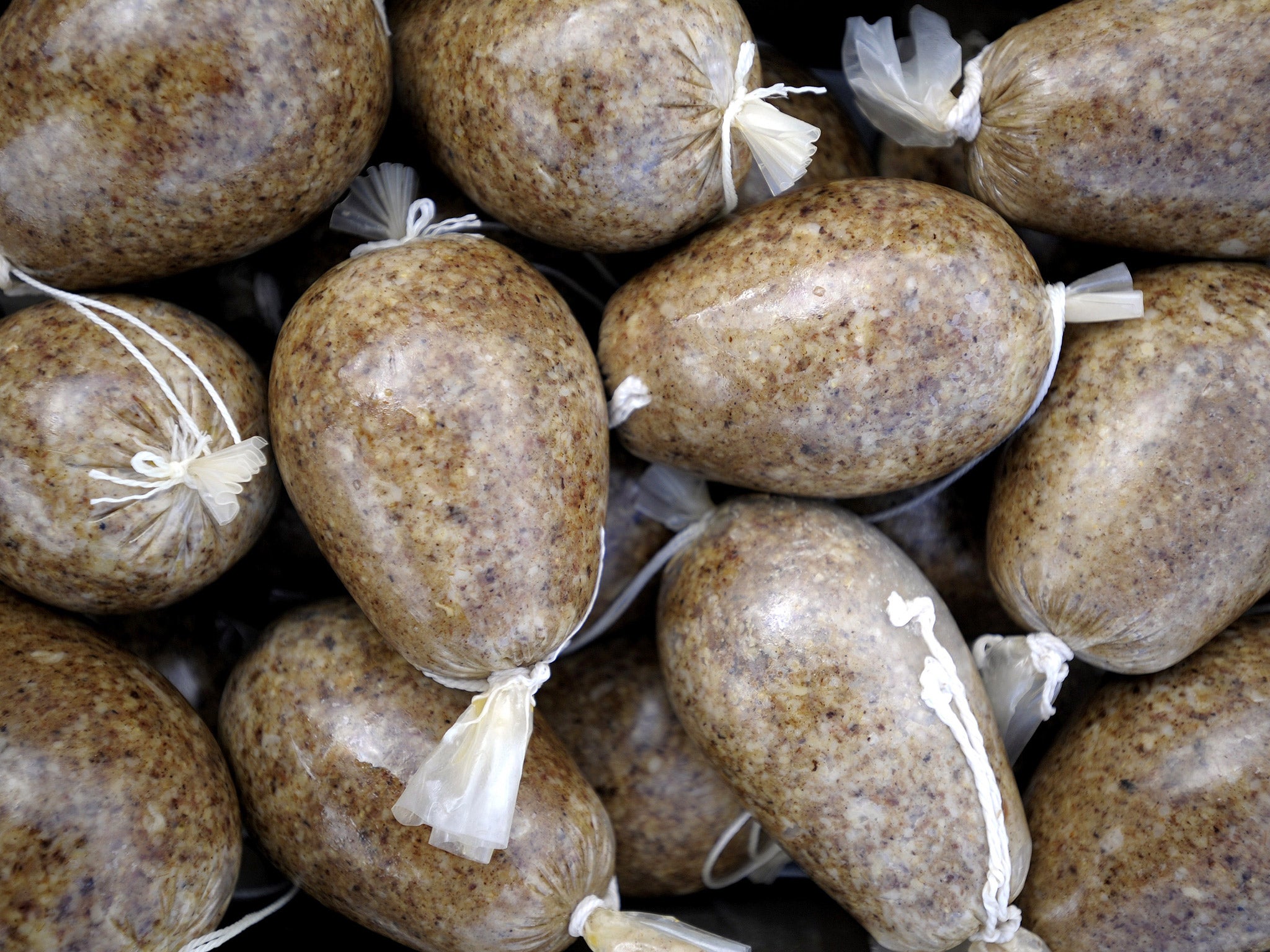Ranald Macdonald and Lord McColl plead for end to ban on export of haggis to US
The latest bid to send haggis across the Atlantic saw a member of the US embassy tucking in. Simon Usborne joined him for his first taste of the chieftain of puddings

Your support helps us to tell the story
From reproductive rights to climate change to Big Tech, The Independent is on the ground when the story is developing. Whether it's investigating the financials of Elon Musk's pro-Trump PAC or producing our latest documentary, 'The A Word', which shines a light on the American women fighting for reproductive rights, we know how important it is to parse out the facts from the messaging.
At such a critical moment in US history, we need reporters on the ground. Your donation allows us to keep sending journalists to speak to both sides of the story.
The Independent is trusted by Americans across the entire political spectrum. And unlike many other quality news outlets, we choose not to lock Americans out of our reporting and analysis with paywalls. We believe quality journalism should be available to everyone, paid for by those who can afford it.
Your support makes all the difference.In a basement restaurant off Bishopsgate in central London, a representative of Barack Obama's government takes his seat at a long table. Stan Phillips only joined the US Embassy in London last month, as counsellor attaché for agricultural affairs. Now, as bagpipes play, he is about to endure a bizarre initiation in British eccentricity, cultural stereotypes and sheep innards.
Phillips has been invited to taste haggis at a Burn's supper, a few days before Burn's Night, to be served with a side of international diplomacy. The host, Ranald Macdonald, a man described by Tatler magazine as "the most politically incorrect restaurateur in Britain", sits opposite the American, and alongside a peer and a Scottish explorer, to plead for an end to ban on the export of haggis to the US.
Tartan-clad waiters at Boisdale, which roasts and boils four tons of the savoury pudding a year, bring out the starter – a distended testis of minced offal for each guest, wobbling on mashed neeps and tatties. "We are delighted to be joined here by a virgin," Macdonald announces. He is referring to Phillips, who has not tried haggis, or even visited Scotland.
In 1971, Washington banned the import of any food containing sheep lungs, a key ingredient in haggis (the recipe also calls for the animal's heart and liver, to be chopped and mixed with oats, onions, suet, spices and seasoning, then stuffed in its stomach). A ban on all beef and lamb imports in 1989, during the BSE crisis, placed haggis even further out of reach for the 20 million Americans who claim Scottish heritage.
A campaign to lift the ban has simmered for almost as long. Promise arrived briefly 10 years ago, when President George W Bush visited Scotland. "Yes, haggis, I was briefed on haggis," he said before the G8 summit at Gleneagles, before doing nothing. At the same summit, the French President, Jacques Chirac, suggested that the haggis he had been served by George Robertson, former secretary-general of Nato, had been partly to blame for France's problems with the organisation. "One cannot trust people whose cuisine is so bad," he said later.
Rumours of a breakthrough circulated again in 2010, before swiftly dying, but last year the Environment Secretary, Owen Paterson, raised the issue with his US counterpart. Emboldened, the haggis lobby reached the House of Lords last week when the Conservative Lord McColl, an 82-year-old retired surgeon, triggered one of the stranger debates to be heard in the second chamber.
Lord McColl, who sat next to Phillips at the Burn's supper on Tuesday night, accused America of depriving its citizens of a "wholesome food" that could "help to deal with the greatest epidemic they have – the obesity epidemic..." Lord Winston, the fertility expert and Labour peer, doubted the nutritional merit of haggis, "which I find personally a revolting food," adding: "If it does really deal with obesity maybe we should be promoting it a little bit in Glasgow?" The Conservative peer Lord Forsyth, a former Scottish Secretary, suggested that the Government appoint a special envoy to travel to Washington. "Could I suggest that Alex Salmond is currently looking for a job," he said.
The humour strikes a similar note at Boisdale, as the haggis steams threateningly. In yet another speech, Jock Wishart, the maritime and polar explorer, and a descendant of Burns himself, honours the poet as "the first marketing man for haggis". He recalls eating a haggis substitute – "some kind of German sausage" – at the Miami Highland Games in Florida. "I hope that this silly business with sheep lungs can be taken away," he says, appealing directly to poor Stan Phillips.
Perhaps saving room for the main course, an unholy union of Aberdeen fillet steak topped with an Alaskan crab's leg, Phillips lifts his first forkful gingerly. He later tried to hide half his haggis under his cutlery. While Macdonald leaves the dinner with the impression that his American guest had enjoyed the delicacy, Phillips shows promise as a diplomat. "Well I'm posted here for three years, so I guess I'm going to have to eat haggis two more times," he says, promising to report back to the ambassador.
Join our commenting forum
Join thought-provoking conversations, follow other Independent readers and see their replies
Comments